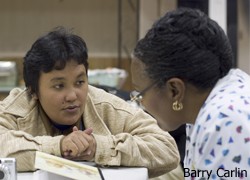Emotional/Spiritual Care

— Barry Carlin
Disasters impact lives and the dimensions that express life:
- physical (a destroyed home, bodily injury)
- social (disrupted relationships and routines)
- psychological (intellectual and emotional)
- spiritual (life meaning and connectedness).
Long-term recovery must involve consideration of, and attention to, all aspects of individual, family and community life in order to affect a holistic recovery.
The Emotional and Spiritual Relationship
The emotional and spiritual relationship is porous. The “ministry of presence” provides a non-anxious presence and the opportunity to be an active listener while holding an outreached hand, offering a cup of coffee, or mucking out a home. To engage a person impacted by disaster is to ask them to tell their story.
Emotional Care
Emotional care takes on many shapes and applications and can have a variety of purposes. Most often the critical part of emotional care is active listening. Emotional care offers an opportunity for victim/survivor/caregiver to express their emotions without judgment on the part of the listener.
Spiritual Care
Spirituality seeks connection (through belief systems and relationships) to something beyond or greater than oneself in order to find meaning in life. This could be a spirit or transcendent being, a community or group, nature, etc. A person’s connection could be to one or several of these revelations, or engaged throughout life and creation.
Spiritual care is to devote presence, attention and respectful assistance to helping people (1) discern the meanings in their life in what is for them a new environment of destruction and pain and (2) make decisions about how they will seek to live out their lives with meaning as the recovery unfolds (conversation with Foster McCurley, November 24, 2003).
Disaster emotional care and its relationship to disaster spiritual care
Spiritual care providers partner with mental health professionals in caring for communities following disaster. Spiritual and emotional care share some similarities but are distinct healing modalities. Spiritual care providers can be an important asset in referring individuals to receive care for their mental health and vice versa.